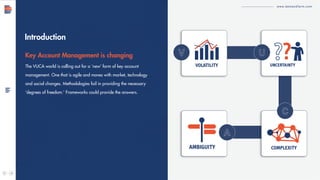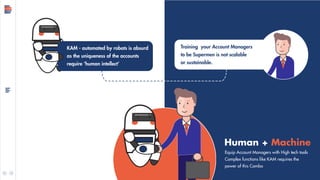Account planning frameworks
- 1. Account Planning Frameworks Why frameworks are the way forward for successful KAM?
- 2. Table of Contents • Introduction • Problems with KAM • Why Frameworks and Not methodologies/processes? • KAM Frameworks • Human + Machine • Conclusion www.demandfarm.com
- 3. Introduction Key Account Management is OLD It would not be incorrect to say that key account management is as old and established as management itself. The last four decades have seen strategic account management being driven by methodologies. Not to forget the consultants, who always had their ‘way’ of doing key account management. www.demandfarm.com
- 4. www.demandfarm.com Introduction Key Account Management is changing The VUCA world is calling out for a ‘new’ form of key account management. One that is agile and moves with market, technology and social changes. Methodologies fail in providing the necessary ‘degrees of freedom.’ Frameworks could provide the answers.
- 5. www.demandfarm.com Decentralised DMUs No value creation by Managers Negative Impact of KAM Standarization Rigid Traditional key account management Problems with KAM
- 6. www.demandfarm.com Those days have gone when all the organizations had centralized procurement units. Now with the influence of subscription economy, the decision making is getting decentralized across the teams. Country level/Department level/Functional level buying is happening. More stakeholders are involved in the process that often salespeople end up having no idea who is involved in decision process. As the sales process is getting increasingly difficult with the expansion of DMUs in the organizations, every account manager must need a new understanding of the B2B sales process. “The typical buying group for a complex B2B solution involves six to 10 decision-makers” -Gartner Decentralised DMUs Country level/Department level/Functional level buying is happening
- 7. www.demandfarm.com Key account management is an art of offering value to the key accounts. KAM must be an ever-evolving, cross-functional and multi-year journey for an organization. Rather than rigid, an agile function is required because no long term plans can be formulated in this ever changing market. For organizations with a traditional rigid structure, the implementation of KAM practice will be a complex undertaking. Account Managers must be comfortable in experimenting and offering flexibility to impact customer success and maintain a strong relationship with them. Key account management is more of an art than a "formula." Traditional key account management is rigid KAM must be an ever-evolving, cross-functional and multi-year journey
- 8. www.demandfarm.com Key account managers are the people who build and nurture loyal, long-lasting relationships with each of the high-value customers of an organization. A smart key account manager should develop dynamic business intelligence to tackle this evolving market. According to BTS, this is the "knowledge of how the drivers of customer growth, profitability, and cash flow are changing, of how the customer’s markets are changing, and of how the interrelationships within the customer’s business are changing."Key account managers who fail in this, end up finding it harder to create value to the customers. Every key account manager must focus on relationship-based revenue and value-based selling. Focus on relationship-based revenue and value-based selling. No value creation by Managers Key account manager should develop dynamic business intelligence to tackle the evolving market
- 9. Standardizing the complete KAM process is not possible because no one size fits all. It varies by industry, country and even organizations. For every key account, it really matters for a difference in perspective, planning, and execution. Every key account must be managed with unique compelling action and a strategic vision. Standardization of KAM will negatively impact the key accounts as understanding the client’s business and being flexible in aligning the objectives, goals of KAM is really necessary. This flexibility can enable unlocking new revenue potential in key accounts.. No one size fits all Negative Impact of KAM Standardization Every key account must be managed with unique compelling action and a strategic vision www.demandfarm.com
- 10. 3M 3M 3M 3M 12x 12x 12x 12x 12x 12x A113 A eneam m assa Venenatis vitae_ 0 1 OOPS! OOPS! SQR SQR A113 A113A113 12x www.demandfarm.com Methodologies had been the guiding factor for years in the industry. It has helped us with set of principles, tools and practices to achieve our goals. But in the evolving world, the industry needs a super power with a loose structure which can offer room for innovation and experimenting. Say Hi to Frameworks!
- 11. Key account managers can focus on monitoring and making changes in the process rather than planning. Rigid methodologies and processes might not work! www.demandfarm.com Why Frameworks and Not methodologies/processes? Every key account needs a unique approach. They entail a flexible and configurable framework based on their needs. A Loose Framework with flexibility is the key
- 12. www.demandfarm.com Account Segmentation White Space Analysis Relationships Communication Matrix Competition Analysis Value Co-creationMetrics Read More Read More Read More Read More Read More Read More Read More KAM Frameworks
- 13. 1. Quantify the relationship health of your key accounts with an account health score 2. Understand the relationships objectively and avoid unpleasant surprise or unexpected setbacks Account Segmentation www.demandfarm.com HighLow High Low STATUS STRATEGIC STREAMLINE STAR Status : Maintain the status quo Streamline : Manage for profitability Strategic : Invest mindshare and ensure profitability Streamline : Invest time & money. Need not be profitable yet. Account Attractiveness
- 14. 1. Where are we engaged today? 2. Where are the opportunities? 3. Where are the white spaces of growth? 4. Farming & Mining growth? Buyingcentres Offerings www.demandfarm.com White Space Analysis
- 15. 1. Get the hierarchy in your key account organization 2. Understand who are your Champions, Promotors, Distractors and so on., 3. Know the influence people have on each other 4. Who controls what budget? Relationships www.demandfarm.com
- 16. Communication Matrix www.demandfarm.com 1. All meetings between client stakeholders and account team are captured in this matrix. 2. Shows you the communication and interaction pattern over the past 12 months. 3. The meeting matrix helps to account teams answer important questions when planning a communication strategy for an account 4. Also, get year wise verdict and know whether you’re in ‘Super touch’ or you need to work more on the volume of meetings.
- 17. 1. Identify the strenghts and weakness of competitors 2. Get the analysis of Customer Spend vs Wallet share Competition Analysis www.demandfarm.com
- 18. 1. Account Plans: Get all your account plans at one place. 2. Relationship: Know power, affinity, and opportunities with the contacts. 3. KAM Quadrant: Quantifying the overall relationship health for all the accounts. 4. Win-Loss: Accounts and Offerings that are won or lost. Metrics www.demandfarm.com O pportunities Active Opportunities What's your Pipeline today? O pportunities Win/Loss Analysis You win most, you lose some. Engagem ents Engagements What's happening with the Opportunities you've won? Accounts Revenue Tracker Show me the MONEY? Accounts Key Indicators Metrics that matter for key Account Management. Accounts Revenue at Risk Roll up your sleeves, hustle! Accounts KAM Quadrant How are your Key Accounts positioned? Contacts Relationships Who loves me, who doesn't? Who controls the moolah? O fferings Offering-wise Revenue What is selling. What is not? Plans Planned Revenue What the Boss man wants.
- 19. Equip Account Managers with High tech tools Complex functions like KAM requires the power of this Combo Human + Machine www.demandfarm.com KAM - automated by robots is absurd as the uniqueness of the accounts require ‘human intellect’ Training your Account Managers to be Supermen is not scalable or sustainable.
- 20. Frameworks are the way forward to transform your KEY ACCOUNT MANAGEMENT PROCESS. Start your New KAM Journey Now!




















